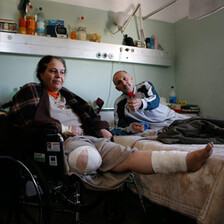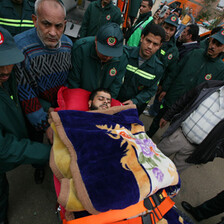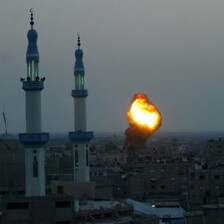Gaza Strip 2 January 2009
At al-Shifa hospital, Gaza’s largest, an unidentified injured man is laying at the hospital’s intensive care unit. He was hit by shrapnel from an Israeli missile that struck a target at the Samer crossroad in the Omar al-Mukhtar street in Gaza City at noon yesterday.
“This wounded patient has sustained critical injuries and his condition is unstable, but we don’t yet know his identity, he is still unknown,” Dr. Omar Manasra, the on-duty doctor of the intensive care unit (ICU) said.
Manasra added, “Since the Israeli strikes began on Saturday, we have received at least 30 unidentified wounded at the ICU; most of them were later identified, but this took some time. We just labeled them with figures like, unknown number 1, number 2, etc.”
Manasra explained the challenges faced by the ICU with the mounting number of wounded: “We suffer a severe lack of medicines, equipment and beds at our unit. In the first day of the air strikes alone, we received almost 50 cases, and that has overloaded our capacity.
“We have only 12 beds, so we have been forced to open new emergency ICUs in other sections like the cardiac, the orthopedic and the maternity wards. Also, I would like to add that we lack basic ICU medicines like antibiotics … In addition we are in need for equipment like ventilators and monitors.”
In the Gaza Strip, home to 1.5 million residents, there are seven main hospitals. According to Hammam Nasman, spokesperson of the Hamas-run health ministry, such an emergency situation in Gaza cannot be dealt with by the hospitals.
“The health situation in Gaza is still miserable as Gaza’s [medical professionals] try relentlessly to cope with this unprecedented emergency situation. Our field crews are at risk and four medics have been killed and a few others injured during rescue operations,” Nasman explained.
Nasman added that there are 1,534 physicians at all the main hospitals and they cannot serve the needs of all of those requiring treatment during this emergency situation. As a result, many cases have been transferred to other private hospitals or clinics.
Nasman pointed out that so far, his ministry has been coordinating with concerned Egyptian and other Palestinian bodies in order to distribute some Arab-provided assistance. He alluded to the need for more assistance as the hospitals lack 230 medical needs including alcohol, Bludine and stitching thread.
He also confirmed that most of the power generators at the hospitals have been depleted of their fuel stocks and that many of them have broken down and need spare parts, the import of which Israel denies. Gaza has been experiencing electricity blackouts for more than 70 percent of the time, on a daily basis, since Israel severely restricted the import of fuel to Gaza’s power plant in November of last year, when a six-month Egyptian-brokered truce collapsed following an Israeli attack on Gaza.
Dr. Moawiya Abu Hassanein, chief of the emergency and ambulance department at the health ministry, said that the ambulances run by the ministry are operating at less than 50 percent of their actual capacity, as Israeli air raids have so far damaged five ambulances and three fire trucks. Two ambulance crew members are reported to have lost their lives while responding to the scenes of Israeli strikes.
The Israeli attacks from air, sea and ground that began last Saturday on the pretext of halting the firing of rockets from the coastal enclave have so far claimed the lives of more than 400 Palestinians and wounded at least 2,000. Most of the casualties are civilians and non-combatants, like the unidentified patient lying in al-Shifa hospital.
Unidentified Palestinians are being victimized for the sake of unidentified objectives. Israel claims it is targeting Hamas, while in fact, it is targeting whoever and whatever in Gaza. For the past seven days, Israeli air raids completely devastated scores of civilian ministerial buildings, municipal premises, charities, universities, schools, homes and mosques.
Israeli pilots in fighter jets do not see or care about the identities of those who receive their bombs as it is not just Hamas but the whole of the Palestinian people who are their targets. Meanwhile, Gaza doctors struggle to find the identities of what is left of the victims after those bombs are delivered.
Rami Almeghari is contributor to The Electronic Intifada, IMEMC.org and Free Speech Radio News and is a part-time lecturer on media and political translation at the Islamic University of Gaza. Rami is also a former senior English translator at and editor-in-chief of the international press center of the Gaza-based Palestinian Information Service. He can be contacted at rami_almeghari A T hotmail D O T com.
Related Links





